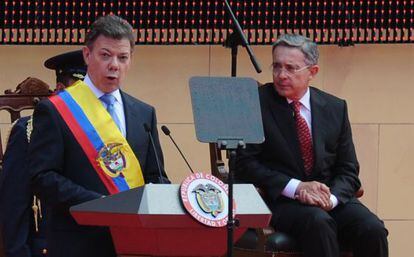Fight between Uribe and Santos splits Colombia's conservatives
Former president goes beyond regular Twitter attacks to create alternative electoral platform

A vicious fight between Colombian President Juan Manuel Santos and his predecessor and onetime friend, Álvaro Uribe -- the country's most popular leader in recent times -- has jumped from Twitter to the public foray.
Uribe, who uses the social media micro-blog daily to criticize his former defense minister for what he calls Santos' lax policies on terrorism and friendliness with Venezuela's President Hugo Chávez, announced recently that he was creating a new political platform, Democratic Center Coalition (PCD). Its goal is to capture the presidency in 2014 with its own candidate.
The rift between the former president and Santos, who as defense minister was a star in Uribe's Cabinet, has divided Colombia's conservative forces, especially among the ruling U Party of which both men are members.
The iron-fist strategy Uribe launched during his 2002-2010 term in office against the Revolutionary Armed Forces of Colombia (FARC) and other guerrilla groups was seen as one of the most successful offenses undertaken by any president against the insurgency.
Uribe describes the platform as "a crusade against terrorism"
Its biggest accomplishments were the March 2008 bombing raid of a FARC secret camp in Ecuador, which claimed the life of the guerrilla leader Raúl Reyes, and the July 2008 rescue of former presidential candidate Ingrid Betancourt, three US defense contractors and 11 police and military officers who had all been held for years by the insurgents.
Uribe's popularity -- as well as that of his defense minister -- soared following these two secret operations. But these triumphs by a once dynamic duo were forgotten when Uribe began publically lambasting his successor for, in his view, going soft on terrorism. He believes that Santos, who he virtually hand-picked as his successor, has, in his words, jeopardized national security by trying to open the door to peace negotiations with the FARC on repeated occasions. Uribe has also criticized Santos for making Chávez "his best friend."
Uribe's political platform, which he describes as "a crusade against terrorism," has gained momentum among many sectors following the rash of recent attacks and killings by FARC guerrillas in Cauca department in southeast Colombia. While Santos assured the public that the army was "in full control" of the department, the guerrillas invaded the town of Toribio and forced all of its 3,000 residents out. Uribe wrote in his Twitter account that the president "was weak."
Although Santos' approval rating has dropped in recent months, the state of the economy is playing in his favor with continued growth. And according to polls, most Colombians favor Santos' conciliatory policies which have helped eased the tensions with Chávez and Ecuadorian President Rafael Correa, who broke relations with Uribe after the 2008 secret bombing raid.










































